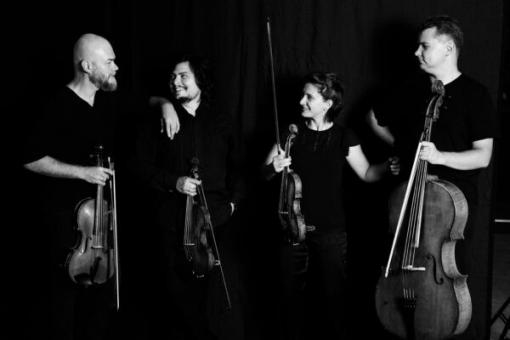This year’s 27th edition of the international music festival Concentus Moraviae is still at the beginning of its almost month-long program, yet in terms of dramaturgy it is not holding back at all. After the opening featuring Argentinian and Uruguayan tango in Boskovice and Balkan music in Ivančice, the festival brought the Arcadia String Quartet to the atrium of the town hall in Kyjov on Thursday 2 June, where they performed the String Octet in C Major by Romanian composer George Enescu together with their friends from the Transylvanian Philharmonic Orchestra. In addition to the members of the quartet (violinists Ana Török, Răsvan Dumitru, violist Traian Boală and cellist Zsolt Török), there were also violinists Vlad Răceu, Valentin Șerban, violist Mihai Oșvat and cellist Ștefan Cazacu. The concert was held under the auspices of the Ambassador of Romania to the Czech Republic, H.E. Antoaneta Barta.
Although compositions for string octet can be found in the works of a number of composers (for example, Dmitri Shostakovich, Reinhold Glière, and Max Bruch), due to their operational demands (and the small number of ensembles), these works rarely appear on the programs of musical evenings. I wouldn’t be surprised if Thursday’s concert was for many listeners their first encounter with this unique instrumentation, or at least first live and unreproduced. Moreover, the String Octet in C Major, Op. 7, by Romanian composer and world-renowned violinist and conductor George Enescu, is one of an imaginary trio of essential octets. This trio is rounded off by works by Felix Mendelssohn-Bartholdy and Niels Wilhelm Gade. The form of Enescu’s octet can be divided into the movements Très modéré, Très fougueux, Lentement and Mouvement de valse bien rythmée, but the individual movements contain even more subtle divisions. The work itself, however, is played attacca and can be viewed as a one-movement cyclical piece in which the first movement is an exposition, the second and third a performance, and the fourth a reprise. According to scholars, Franz Liszt’s Piano Concerto in E flat major may have been a likely precursor for Enescu’s formal layout and handling of themes.
The piece opens with an opening motif in parallel octaves, while one of the cellos accompanies with a held tremolo on the key of C. Already these opening bars reveal the strengths of the octet as a particular piece and of the ensemble itself. In addition to its powerful sound, this scoring allows for a truly full and sonically varied bass (harmonic) part, which can simultaneously contain figurations and tremolos, pizzicato and decomposition, or long tones and staccatos. The same applies, of course, to the pair of violas, which Enescu makes exemplary use of in his octet. The composer completed the work in 1900 and in terms of musical composition it is a polished synthesis of late Romantic approaches and more modernist artistic elements. Musical surfaces full of tenderness have their place here, as do harsh, avant-garde-influenced dissonances.
The staging of the difficult work itself was riveting. The instrumentalists – despite the fact that they do not normally perform together – were superbly matched rhythmically and, above all, expressively. It is the stylistic variety of Enescu’s octet that requires a rich interpretative arsenal to highlight (and sometimes soften) the contrasts between the different areas. In this respect, the Arcadia Quartet and the musicians of the Transylvanian Philharmonic could not be faulted. The romantic melodies overflowed with sweetness (the moment when the birds started singing and the bells started ringing in the suddenly softened music was particularly endearing) and, on the contrary, the exacerbated gradations were cutting enough. Also impressive was their handling of dynamics, which were suitably graded and punctuated with a feeling for the musical phrases.
The third concert of this year’s Concentus Moraviae festival featured a lesser-known, but all the more interesting cast of musicians, led by the flagship of octet literature. The lively staging, which, however, also showed a tremendous feeling for the more romantic moments of the piece, made the joy of the successful evening even greater. One can only hope that octets will begin to appear on programs much more frequently. There is plenty to choose from.
Arcadia Quartet
Ana Török / violin
Răsvan Dumitru / violin
Traian Boală / viola
Zsolt Török / cello
Vlad Răceu / violin
Valentin Șerban / violin
Mihai Oșvat / viola
Ștefan Cazacu / cello
Program:
George Enescu: String Octet in C major, Op. 7
Thursday, 2 June 2022
Kyjov, atrium of the Town Hall (originally scheduled for the Kulturní dům)
19:30
































No comment added yet..